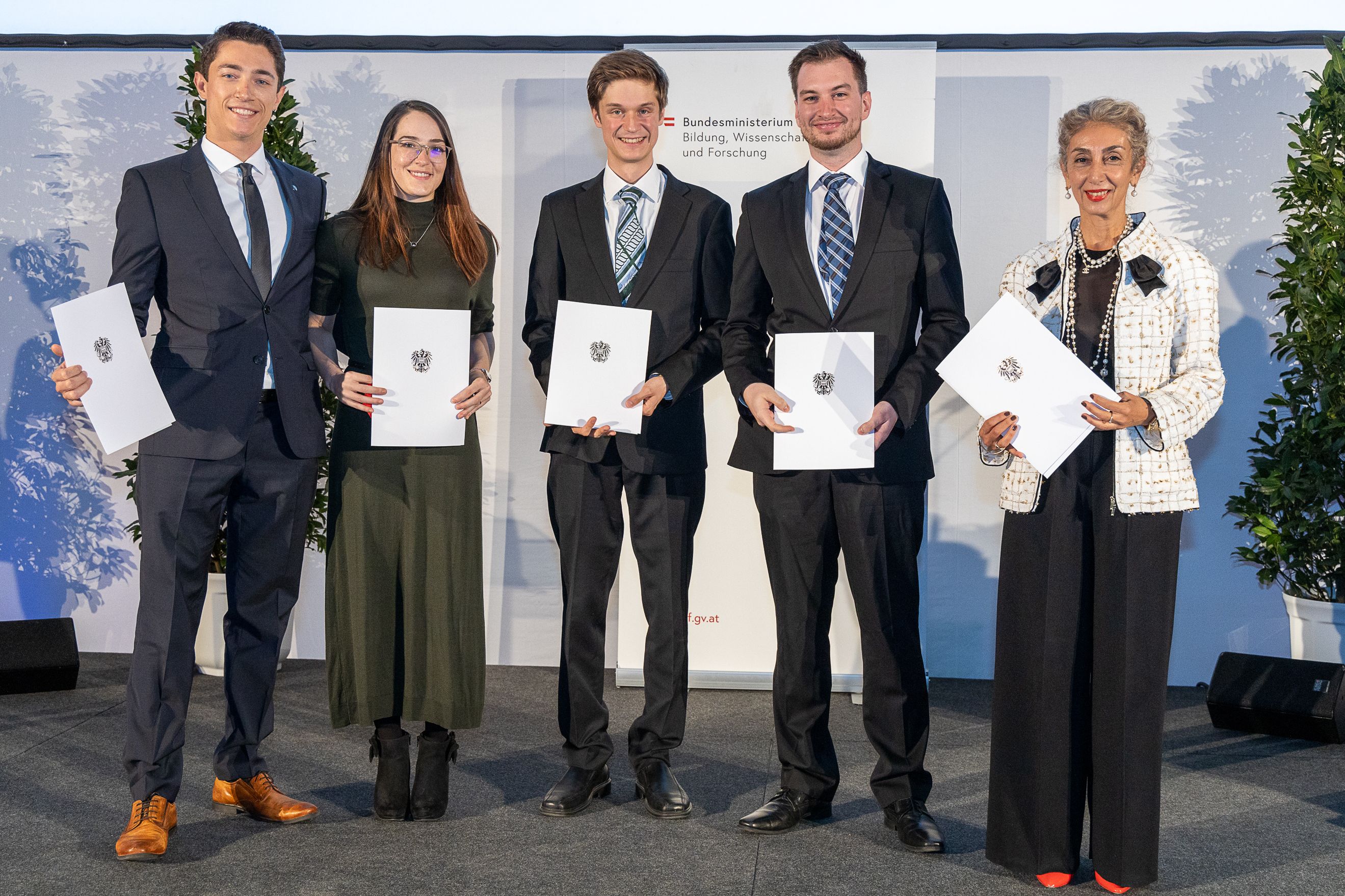
(Vienna, 24-09-2021) A MedUni Vienna teaching project was awarded a recognition prize in the category "Learning outcomes-oriented teaching and examination culture" in the course of the Ars Docendi State Awards. The team consisted of Paul Supper, Iris Acker, Patric Kienast, Florian Simon Linke, Andrea Praschinger and Anahit Anvari-Pirsch were awarded with three-tier Peer-Teaching Key-Feature Cases". This is a compulsory elective subject in the 5th year of medical studies at MedUni Vienna.
In order to accompany the transition from theory to practice, MedUni Vienna staff has developed a three-tier peer-teaching format, the learning outcome of which is the strengthening of clinical action competence and comprises the following stages:
1. Interactive Key-Feature Cases: for the simulation of clinical action skills with reflection
2. Remote Background: a background presentation of official learning materials, relevant guidelines and publications, followed by a self-assessment with encouragement for independent study
3. Interactive Case Discussion: a live webinar with discussion and reflection focusing on clinical decision-making
The peers, student teachers with medical didactic training, were already experienced in the challenges of clinical transition and were prepared for the teaching role through training and previous experience. The case development process was approved by clinical experts, quality controlled through feedback loops and continuously improved.
This three-tiered peer-teaching format addresses entry-level clinical practice challenges from the student's perspective and promotes clinical decision-making through high student activation, refreshment of previous learning materials, promotion of lateral thinking and application of evidence-based medicine. It is applicable to other medical universities and addresses the challenges of climbing the Miller pyramid.
Recognition of the Jury:
Peers have always played a large role in studies. If this topic has played a steadily growing role in university didactic discussions in recent years, it is due to the realisation that certain learning goals can best be achieved in peer teaching by advanced students - and that the gain is equally beneficial to both parties. Therefore, it is by no means due to economic considerations that the jury chose the comprehensive peer teaching project "Introduction to Clinical Practice" of the MedUni Vienna (Dr. Paul Supper and team: Dr.in Iris Acker, Dr. Patric Kienast, Dr. Florian Simon Linke, Mag.a Dr.in Andrea Praschinger, Ao. Univ.-Prof.in Dr.in Anahit Anvari-Pirsch). This project, designed as an elective subject, attempts to facilitate the entry of a large group of students of human medicine into the clinical phase of their studies (5th year). This is done by way of a broad programme of support by advanced and medical didactically trained students. Knowledge already acquired should be intensified and reflected upon with regard to its application. With regard to clinical decision-making, independence, networked thinking and evidence-based medicine are practised. The peers promote this by processing self-experienced clinical cases, which are dealt with both in presence and online. In the first stage, corresponding videos are made available and individualised options are developed for action; the second stage, which is also video-based, serves to repeat learning elements from the studies and the self-assessment, and the third takes place as a live webinar in which different aspects are examined in greater depth and questions are discussed. Last but not least, experiences from the physician/patient contact are discussed. Quality assurance is provided by reviewing the examples by clinical subject experts and systematic feedback by the students.
The jury was impressed by the way in which the commitment of more experienced fellow students and their experience is used productively here on the threshold of the clinic. An innovative concept was developed that requires a large amount of resources in this form, but which has a high potential for transfer to other higher education institutions and contexts.
On the Ars Docendi Government Prize
In order to emphasise the great importance of teaching in the science system on the one hand and the necessary cooperation in the tertiary education sector on the other, as well as to support the associated quality development in higher education teaching as a whole, the "Ars Docendi State Prize for Excellent Teaching" was announced for the ninth time together with the Universities Conference, the Universities of Applied Sciences Conference, the Austrian Conference of Private Universities, the Rectors' Conference of the Austrian Universities of Teacher Education and the Austrian National Union of Students. The prize was awarded in the five thematic categories with eleven recognition prizes. This time there were a total of 191 submissions with 444 nominees from 56 different universities.